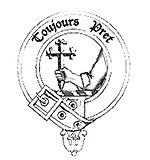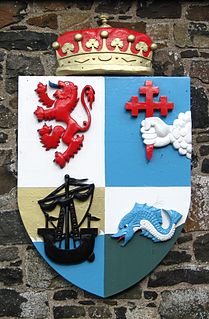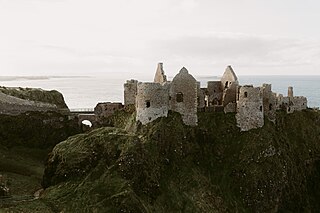Related Research Articles
Sorley Boy MacDonnell, also spelt as MacDonald, Scoto-Irish chief, was the son of Alexander MacDonnell, lord of Islay and Kintyre (Cantire), and Catherine, daughter of the Lord of Ardnamurchan, both in Scotland. MacDonnell is best known for establishing the MacDonnell clan in Antrim, Ireland, and resisting the campaign of Shane O'Neill and the English crown to expel the clan from Ireland. Sorley Boy's connection to other Irish Catholic lords was complicated, but also culturally and familiarly strong: for example, he married Mary O'Neill the daughter of Conn O'Neill. He is also known in English as Somerled and Somerled of the yellow hair.

Shane O'Neill, was an Irish chieftain of the O'Neill dynasty of Ulster in the mid-16th century. Shane O'Neill's career was marked by his ambition to be the O'Neill—sovereign of the dominant O'Neill family of Tír Eoghain—and thus overlord of the entire province. This brought him into conflict with competing branches of the O'Neill family and with the English government in Ireland, who recognised a rival claim. Shane's support was considered worth gaining by the English even during the lifetime of his father Conn O'Neill, 1st Earl of Tyrone. But rejecting overtures from Thomas Radclyffe, 3rd Earl of Sussex, the lord deputy from 1556, Shane refused to help the English against the Scottish settlers on the coast of Antrim, allying himself for a short time instead with the MacDonnells, the most powerful of these settlers, Shane viewed the Scottish settlers as invaders, but decided to stay his hand against them with hopes of using them to strengthen his position with the English; however, tensions quickly boiled over and he declared war on the Scottish MacDonnell's defeating them at the Battle of Glentaisie despite the MacDonnells calling for reinforcements from Scotland. The Scottish MacDonnells would later assassinate Shane O'Neill and collect the bounty on his head.

Clan Donald, also known as Clan MacDonald, is a Highland Scottish clan and one of the largest Scottish clans. The Lord Lyon King of Arms, who is the Scottish official with responsibility for regulating heraldry in that country, issuing new grants of coats of arms, and serving as the judge of the Court of the Lord Lyon, recognizes under Scottish law the High Chief of Clan Donald. Historically the chiefs of the Clan Donald held the title of Lord of the Isles until 1493 and two of those chiefs also held the title of Earl of Ross until 1476.
Alasdair Mac Colla Chiotaich MacDhòmhnaill, also known by the English variant of his name Sir Alexander MacDonald, was a military officer best known for his participation in the Wars of the Three Kingdoms, notably the Irish Confederate Wars and Montrose's Royalist campaign in Scotland during 1644–5. A member of the Gaelic gentry of the Clan MacDonald of Dunnyveg, a branch of the Clan Donald active in the Hebrides and Ireland, Mac Colla is particularly notable for the very large number of oral traditions and legends which his life inspired in the Highlands.

Randal MacDonnell, 1st Marquess of Antrim (1609–1683) was a Roman Catholic landed magnate in Scotland and Ireland, son of the 1st Earl of Antrim. He was also chief of Clan MacDonnell of Antrim. He is best known for his involvement, mostly on the Royalist side, in the Wars of the Three Kingdoms.
Randal Macsorley MacDonnell, 1st Earl of Antrim was called "Arranach" in Irish/Scottish Gaelic having been fostered in the Gaelic manner on the Scottish island of Arran.
The Battle of Glentaisie, was an Irish battle fought in the north of Ulster on 2 May 1565. The result was a victory for Shane O'Neill over the Clan MacDonald of Dunnyveg. The conflict was a part of the political and military struggle, involving the English and occasionally the Scots, for control of northern Ireland. Although the MacDonalds were a Scottish family, based principally on the island of Islay in the Hebrides, they had long been associated with the Gaelic polity rather than the Kingdom of Scotland.

Clan MacDonald of Dunnyveg, also known as Clan Donald South, Clan Iain Mor, Clan MacDonald of Islay and Kintyre, MacDonalds of the Glens (Antrim) and sometimes referred to as MacDonnells, is a Scottish clan and a branch of Clan Donald. The founder of the MacDonalds of Dunnyveg is Eòin Mòr Tànaiste Mac Dhòmhnaill, a son of Iain Mic Dhòmhnaill and Margaret Stewart of Scotland, daughter of King Robert II. Members of the clan actually pronounced and spelled their name M'Connall due to the Gaelic pronunciation of the name Mac Domhnuill thus giving rise to the surname McConnell and its variants. While historically recognised as a clan by the Court of the Lord Lyon, it is now an armigerous clan as it no longer has a chief. The last chief was Sir James MacDonald, 9th of the Clan MacDonald of Dunnyveg or Clan Donald South, who died in London in 1626.

The MacDonnells of Antrim, also known as the MacDonnells of the Glens, are a branch in Ireland of the primarily Scottish-based Clan Donald. Initially part of Clan MacDonald of Dunnyveg, the MacDonnells of Antrim became their own branch in 1558 when Somhairle Buidhe MacDonnell obtained the lordship of the territory in Ireland from James MacDonald, 6th chief of the Clan MacDonald of Dunnyveg. The MacDonnells of Antrim were a sept of the powerful Clan Donald of the royal Clann Somhairle,, that the English crown had attempted to cultivate since the early 14th century in its efforts to influence the course of politics in Scotland. The MacDonnells established a growing presence in Ireland throughout the 15th and 16th centuries,and played a crucial role in the politics of 17th century Ireland. The MacDonnell's achieved much success in Ireland largely to cultural and familial connections to the Gaelic nobility of Ireland. Today the surname is predominantly spelled McDonnell in Ireland and abroad, although many McConnell's are also of the same family, as that is the Gaelic pronunciation of the Mac Domhnaill. Most of the leadership of the Clan wrote their name as a variant of McConnell up until the 17th Century, including Sorley Boy MacDonnell himself. Many of the present-day McDonnell's have a common descent from Sorley Boy MacDonnell.
Coll Ciotach Mac Domhnaill (1570–1647) was a Scottish adventurer and mercenary of the Clan MacDonald of Dunnyveg branch of Clan Donald, who became Laird of Colonsay in 1623, by treachery. His name, which means "Coll the left-handed" or "the crafty", was anglicised as Colkitto. However he only used the nickname Ciotach late in his life in 1629 when it appeared in a Latin translation of a Gaelic letter where Coll refers to himself as "Ego Collatius Kiotach Macdonnell".

The Rathlin Island massacre took place on Rathlin Island, off the coast of Ireland on 26 July 1575, when more than 600 Scots and Irish were killed.

Redshank was a nickname for Scottish mercenaries from the Highlands and Western Isles contracted to fight in Ireland; they were a prominent feature of Irish armies throughout the 16th century. They were called redshanks because they went dressed in plaids and waded bare-legged through rivers in the coldest weather. An alternative etymology, illustrated by Jamieson by a quote from Sir Walter Scott, is that it referred to the untanned deer leather buskins worn by Highlanders, although Jamieson notes that Scott's source, John Elder of Caithness, actually stated its origin was from their habit of going "bare-legged and bare-footed". The term was not derogatory, as the English were in general impressed with the redshanks' qualities as soldiers.
Colla MacDonnell was a son of Alexander MacDonnell, Lord of Islay and Kintyre (Cantire), and Catherine, daughter of the Lord of Ardnamurchan. He died at Kinbane Castle in 1558.

The Route was a medieval territory in Gaelic Ireland, being located on the north-east coast of Ulster. The territory stretched along parts of the coastline of what is now County Londonderry and County Antrim, stretching between Coleraine and Port Brittas (Ballycastle), being bounded on the south by the Clogh River. Originally part of Twescard, a county of the Earldom of Ulster, it was later ruled by the MacQuillans and then the MacDonnells.
The Battle of Ballyshannon was a battle fought in 1247 between Maurice FitzGerald, Justiciar of Ireland and Melaghlin Ó'Donnell, Lord of Tyrconnell, Kinel-Moen, Inishowen, and Fermanagh, near Ballyshannon, Ireland. Maurice FitzGerald defeated and killed Melaghlin O'Donnell.
Clann Somhairle, sometimes anglicised as Clan Sorley, refers to those Scottish and Irish dynasties descending from the famous Norse-Gaelic leader Somerled, King of Mann and the Isles, son of Gillabrigte (†1164) and ancestor of Clann Domhnaill. Primarily they are the Clan Donald, formerly known as the Lord of the Isles, and the mainland Clan MacDougall, and all their numerous branches. Clan Macruari are their lost sept.
James MacDonald, alias McDonnell, 6th Laird of Dunnyveg, Scottish-Gaelic lord, died 1565.

The history of the Bissett family in Ireland can be studied independently from that of the originally identical family in Scotland, because of their unique experience following their arrival in Ulster in the early or mid-13th century. Here, while still remaining involved in Scottish affairs, the Bissetts would establish themselves as the Lords of the Glens of Antrim and quickly become equally, then eventually more involved in the politics of the Irish province, becoming among the most Gaelicised of all the so-called Anglo-Norman families in Ireland. The heads of the leading branch of the family soon adopted the Gaelic lineage style Mac Eoin Bissett, by which they are known in the Irish annals, and which translates as "Son/Descendant of John Byset", after a prominent ancestor born in Scotland. In a number of English and Anglo-Norman sources the same head of the family is referred to as the Baron Bissett, also with variants.

The Irish expedition to Scotland took place during the British Civil Wars in 1644–1645. A group of 2,000 troops sailed from Ireland for Scotland in June 1644. Once in Scotland, they joined forces with the Royalist forces fighting Montrose's Highland campaign. The expedition was the result of an effort by King Charles I to enlist help from Irish Catholics in fighting Parliamentarian forces.
Ellis MacDonnell, Countess of Antrim was an Irish aristocrat of the late Elizabethan and early Stuart eras.
References
- Gerard Murphy, Duanaire Finn III, Irish Texts Society 1953
- Hector McDonnell, The Wild Geese of the Antrim MacDonnells, Irish Academic Press 1996